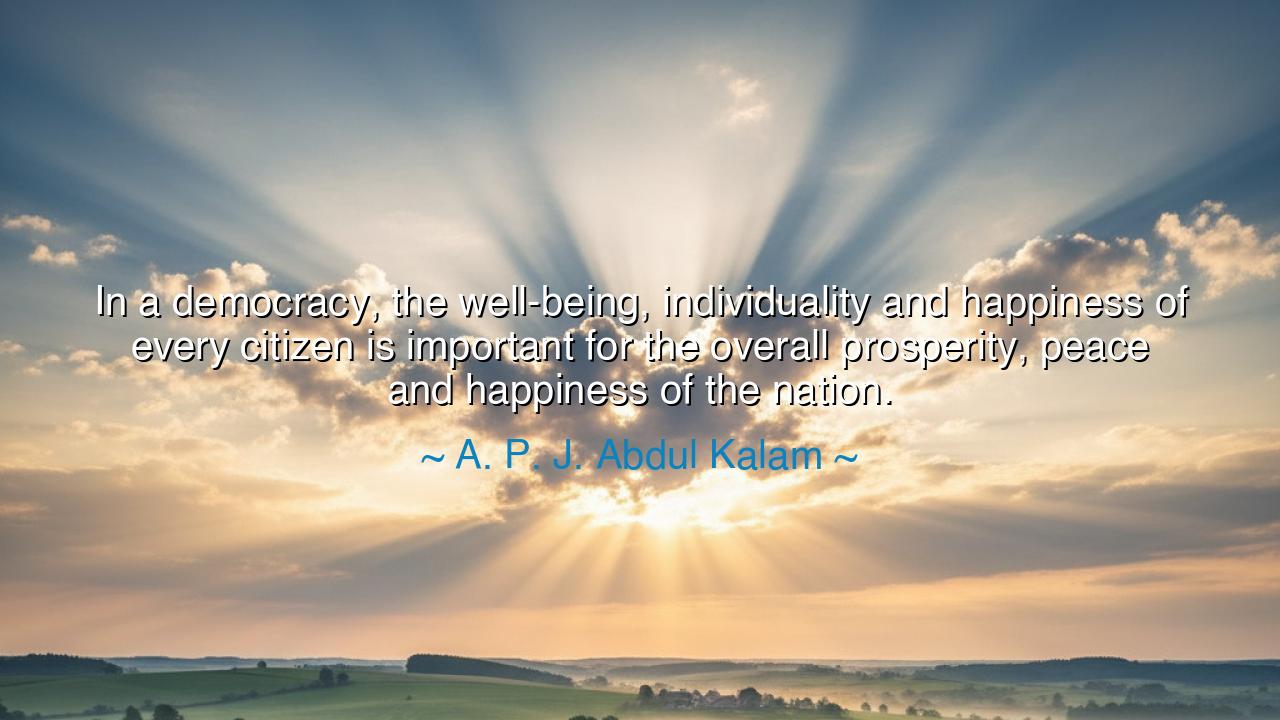
In a democracy, the well-being, individuality and happiness of
In a democracy, the well-being, individuality and happiness of every citizen is important for the overall prosperity, peace and happiness of the nation.






“In a democracy, the well-being, individuality and happiness of every citizen is important for the overall prosperity, peace and happiness of the nation.” Thus spoke A. P. J. Abdul Kalam, the humble scientist, visionary, and former President of India — a man whose wisdom was born not from privilege, but from service to his people. In this statement lies a truth that has guided civilizations and prophets alike: that the strength of a nation is not measured in its armies or its wealth, but in the dignity, freedom, and joy of its people. For democracy, when pure, is not the rule of the majority over the few — it is the harmony of all souls, each voice a note in the grand symphony of the state.
Kalam’s words spring from the deep heart of a man who believed that every citizen matters. His own life was the living example of this truth. Born into poverty in a small coastal town, he rose through learning, perseverance, and faith. Yet he never forgot the fisherman’s child, the laborer’s son, or the village teacher who, though small in status, held greatness in spirit. To him, democracy was not merely a system of governance — it was a sacred trust between the people and their destiny. The well-being of each individual, he taught, was the foundation upon which national peace and prosperity must stand.
For what is a nation if not the collective heartbeat of its citizens? A kingdom may flourish through conquest, but a democracy flourishes only through compassion. The farmer in the field, the craftsman at his bench, the student in her classroom — each must feel valued, protected, and free. Kalam understood this with the clarity of a philosopher and the devotion of a servant. When the individual is crushed beneath the weight of neglect or inequality, the entire structure trembles. When the weakest suffer, the strongest lose their humanity. And when a people’s happiness is ignored, their democracy becomes an empty word.
The ancients, too, knew this truth. The philosopher Aristotle once wrote that the purpose of the state is not mere survival, but the good life — the flourishing of virtue, intellect, and happiness among its people. And in India’s own heritage, the ancient rulers who followed the principles of dharma — righteous governance — were taught that the king’s joy lies in the joy of his subjects. When people prospered, the land itself seemed to bloom; when they suffered, even the heavens were said to weep. Kalam’s teaching is but the modern echo of this eternal wisdom: that the prosperity of a nation is woven from the contentment of its smallest homes.
Consider the story of Emperor Ashoka, the great Indian ruler who once sought power through conquest. After witnessing the suffering of war, he renounced violence and dedicated his reign to the well-being of his people. He built roads, hospitals, and schools; he treated even the poorest citizen as his own kin. Ashoka’s transformation brought peace to his empire and harmony among its people — proof that when a ruler cherishes the happiness of each individual, the entire realm is uplifted. In his spirit, one can feel the same light that guided Kalam centuries later — a vision of leadership rooted in service, not dominance.
Yet Kalam’s words are not only meant for leaders — they are meant for every citizen. For democracy is not the gift of a few to the many, but the duty of all to each other. The individuality of every person — their dreams, talents, and voice — must be respected. Each act of kindness, each honest labor, each vote cast with conscience strengthens the nation’s soul. To neglect another’s welfare is to weaken our own, for in a democracy, no man or woman lives alone; the fate of one is bound to the fate of all.
Let this, then, be the lesson: if we desire peace, let us work for justice. If we desire prosperity, let us nurture compassion. A democracy thrives not through laws alone, but through love — the love of one citizen for another, the belief that every person has the right to happiness and the power to shape the future. The true patriot is not he who boasts of his nation’s greatness, but he who helps another stand, who defends another’s voice, who believes that his neighbor’s well-being is as sacred as his own.
So remember the wisdom of A. P. J. Abdul Kalam: that the destiny of a nation is written not in its monuments, but in the hearts of its people. When every citizen is honored, when every individual is free to dream, when every home holds both dignity and joy — then, and only then, can a democracy claim to be great. For as the ancients said, “The kingdom that guards the smallest flame keeps the whole world alight.”






AAdministratorAdministrator
Welcome, honored guests. Please leave a comment, we will respond soon